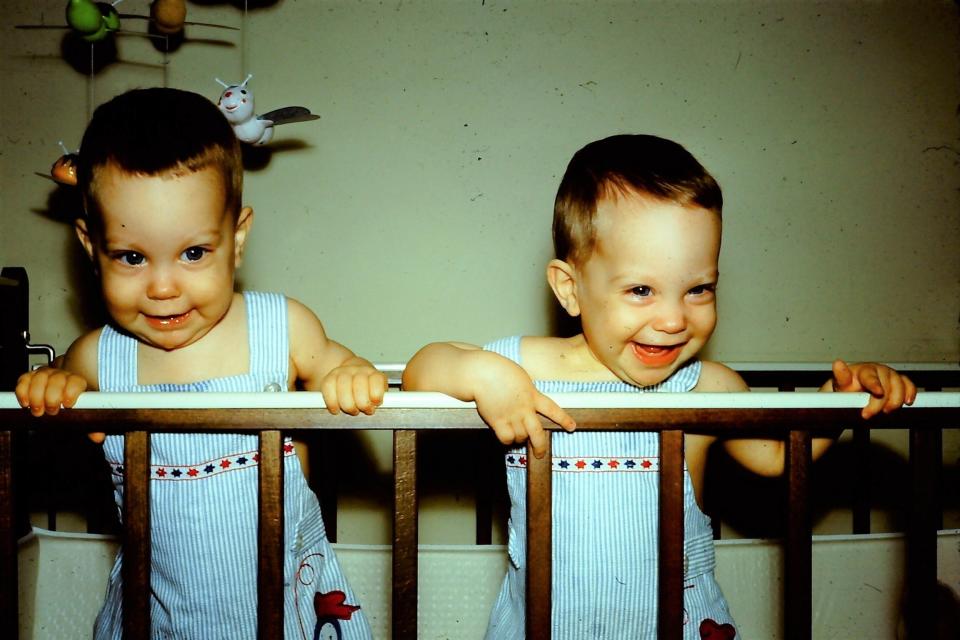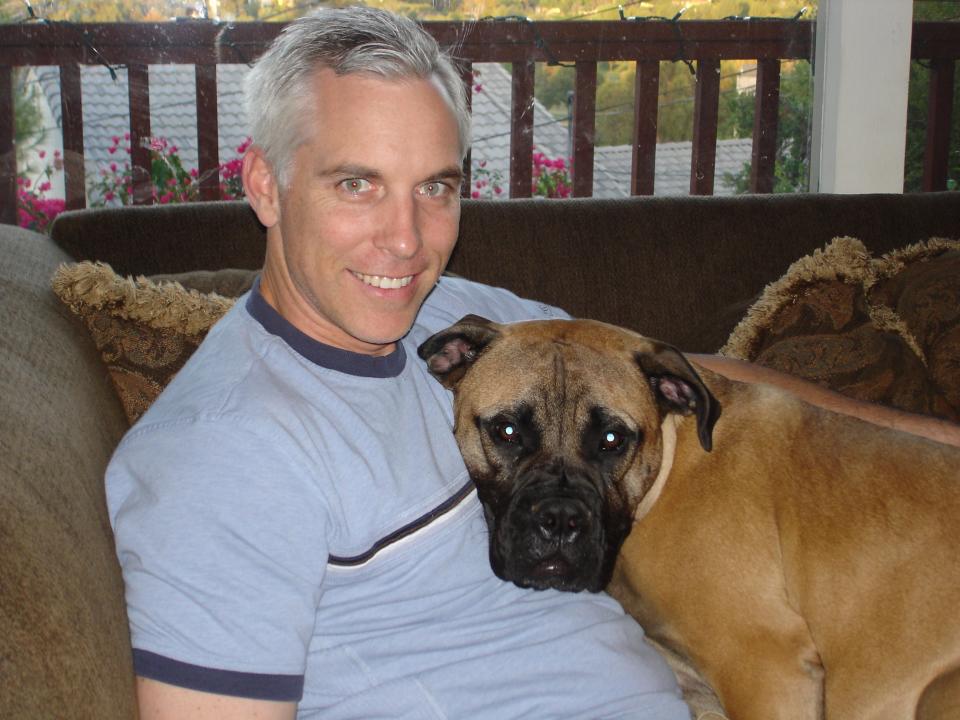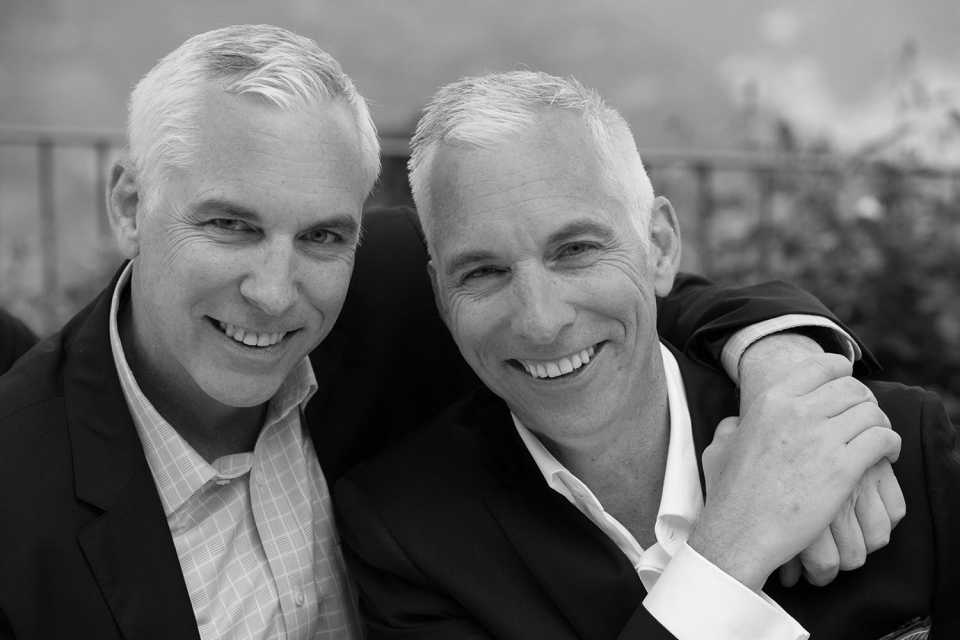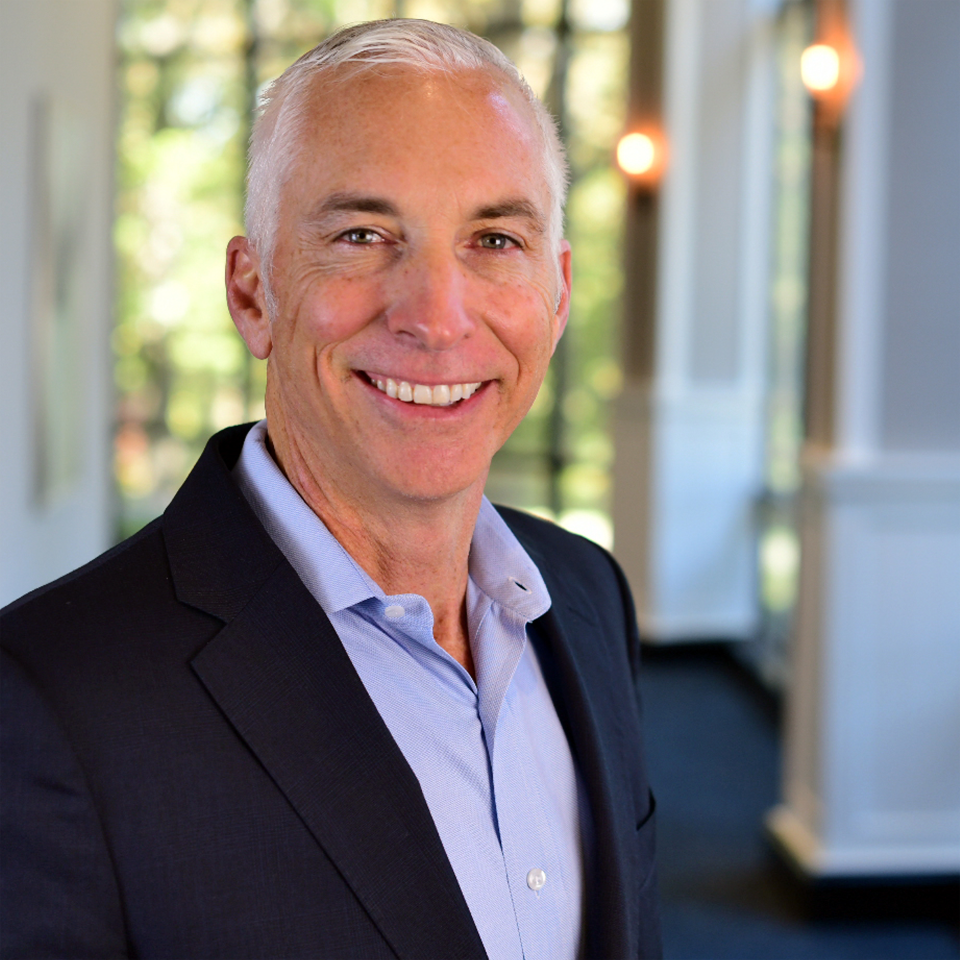My twin died by suicide. I’ve been too ashamed to talk about it – until now.
I don’t talk about Steve anymore. He’s become my secret. The one I’m too ashamed to share.
Steve and I were uncommonly close, that kind of close that only identical twins can understand. Born seven minutes apart, we shared everything. We lived together (except for college) until we were 27. Our mom tells me that when we were just over 2 years old, I talked Steve into climbing into my crib in the middle of the night. Mom found him in the middle of the floor, better at escaping his crib than getting into mine. Once, in a streak of high school independence, we asked for our own bedrooms. That lasted a month before we moved back in together, using the second room as a den.
Sibling rivalry reaches new heights when you’re a twin. You have someone who looks and sounds like you, living a similar life. Steve was objectively smarter than me. He outscored me in every standardized test, from IQ to Graduate Management Admission Test. We did our homework side by side, yet he outscored me on high school finals. His first job paid more, and even when I got my MBA first, his banking job paid twice what my health care job did. It was impossible not to compare. But the competition seemed normal and motivating.

I loved being a twin, even in the small moments. Like the numerous times we’d go on a trip and come out of our hotel rooms wearing the same outfit and argue over who had to change. Or, knowing that no matter what I did, he was always in my corner.
Our careers eventually took us to opposite coasts, but our lives remained intertwined. We spent every holiday, every birthday, together – no matter where we were.
Now, at best, I’m a silent listener to twin stories. At worst, I lie and pretend he didn’t exist.
I didn't see it coming
The day I stopped being one of two was July 12, 2019. It was Friday. My wife and I were watching Netflix when my phone rang. I answered even though I didn’t recognize the number because it was Steve’s area code. It was a Los Angeles police officer. She asked me if I knew Steve.
A person dies by suicide every 11 minutes in America. People who take their own life are in immense pain with no hope for the future. I now know my brother was no different.
But I didn’t see it coming. Steve didn’t fit the simplistic “at risk” stereotype so many of us have, until we know better.
Call 988: The nation's new suicide hotline could be our fresh start
On paper, Steve had everything: an MBA from a top school, a successful banking career, family and friends who loved him. At 53, he had already done well enough to comfortably retire.

But, in fact, he had several risk factors. He had suffered setbacks in his personal life and survived two heart surgeries that weakened him and made it hard for him to play his favorite sport of ice hockey. Always an “active” drinker, he had begun to abuse alcohol and sleeping pills. But, no ... he wasn’t giving away his possessions; he didn’t articulate an end-of-life plan; he wasn’t outwardly despondent. He was stoic. He was proud.
I was worried, but encouraging
The last time I saw Steve was three weeks before he ended his life. He and his girlfriend visited my wife and me in Miami for a quick weekend getaway. I was worried about what I saw. He had gained weight and didn’t seem on top of things. I probed about what was wrong, but I didn’t recognize this as depression. I encouraged him to get active, to look for a new job, to ratchet down the drinking. We talked on the phone two weeks later. He told me he had started to activate on all those things. He seemed proud of his progress.
I’ve since learned that sometimes, when a person is at rock bottom and beginning to come out of depression, that progress itself can be an added risk.

As friends and family, we cannot rely on the dramatic caricature of suicide risk. How many of the 12 million Americans at risk for suicide suffer silently? A study in the Journal of Affective Disorders found that about a third of children and adolescents who died by suicide had no or low demonstration of risk factors. Experts say for adults, that many times the warnings signs can be just as easy to miss.
If we’re to save lives as a society, we must become better at recognizing the more subtle warning signs, overcoming our awkwardness about tough conversations and then crossing that boundary to ask questions. It’s hard to intervene dramatically into someone’s life, but we need to lower the bar for doing so.
Opinion alerts: Get columns from your favorite columnists + expert analysis on top issues, delivered straight to your device through the USA TODAY app. Don't have the app? Download it for free from your app store.
It’s OK to ask someone how they are doing or if they are struggling. It’s OK to ask them if they’ve thought about suicide. Research has shown that talking about suicide does not cause people to act. Let’s normalize saying, I’m here for you. It’s OK to call me in the middle of the night.
Suicide took my son's life. I grieve for people like Meghan Markle, who ask for help and can't find it.
Morgan will be 22 forever. How pressure of college sports can harm athletes' mental health.
There was no explanation
On Steve’s last night, he and his girlfriend had broken up and he was alone in his hillside Los Angeles home. A half-empty bottle of red wine was found next to him on the couch, along with a handwritten list of his important passwords. I looked through his phone obsessively afterward, looking for clues. But there was no explanation. No note to the half he left behind.
I have thought a lot about where to go from here and how to make his death serve some greater good.
To my health care colleagues, so many of you are preternaturally talented. We have so much money pouring into health care. What percentage is dedicated to mental health? It’s hard to monetize mental health, and suicide in particular. We measure success in health care in terms of performing more procedures, or if we are innovative, in avoiding costly events like hospitalizations or trying to improve chronic illnesses. But what about a condition that fits none of those? With no high-cost adverse event to avoid, how do we save money to pay for prevention? The systemic cost of my brother's death was borne by the police department and coroner, not by a busy emergency room or intensive care unit.

What could I have done?
Like so many before and since, my anguish began that night. It is mixed with profound guilt, hurt and shame. How could I have let this happen? Why didn’t I know? What could I have done and why didn’t I do it? Why didn’t I call him that night? How was I so oblivious to the depth of his pain?
I haven’t been able to talk about Steve because I haven’t been able to explain it or face my own failure.
Sharing this secret is a first step. I need to bring Steve back into my present, to figure out how to let go of the guilt and shame I feel about not being able to save his life, and to find ways to help others like him.

The CDC estimates more than 3 million Americans currently have a suicide plan. They need to know we’re here. That we care.
For those of you who are reading this, if you are in pain, please … please … please … tell someone. Your friends and family love you more than you can know. Please ask for help. Speaking for your loved ones, they will be immeasurably happy you did.
If you or someone you know is thinking about suicide, help is available. Call or text 988 or chat at 988lifeline.org
Mike Radu is the CEO of AbsoluteCare, a leading value-based integrated health care provider headquartered in Baltimore and focused on providing comprehensive and preventive care to the most vulnerable populations in Georgia, Louisiana, Maryland and Pennsylvania.
You can read diverse opinions from our Board of Contributors and other writers on the Opinion front page, on Twitter @usatodayopinion and in our daily Opinion newsletter. To respond to a column, submit a comment to letters@usatoday.com.
This article originally appeared on USA TODAY: Suicide prevention: It's OK to ask. Here are signs to look for.

